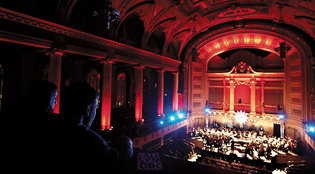 loading
loading
Scene on CampusApocalypse now?The Russian composer Alexander Scriabin (1872–1915) had a mystical approach to his craft and very big ambitions. His goal for Prometheus, for orchestra and colored lights (shown here in performance by the Yale Symphony Orchestra): properly executed, the piece should bring about spiritual transcendence and “the end of the universe as we know it,” says Anna Gawboy ’10PhD, who wrote her dissertation on his work.  Bob HandelmanView full imageProper execution was a problem in 1910, when Scriabin wrote Prometheus. Dissatisfied with the technology available for the light effects he wanted, such as fireworks and tongues of flame, he chose to premiere the work in the dark. There have been attempts over the years to restage it in accordance with his wishes. But Gawboy reexamined the original manuscript, and she and Justin Townsend, a lighting design professor at Northeastern, collaborated on a more authentic staging for the February 13 YSO concert—including lights throughout the hall and a smaller LED light show onstage, performed by a musician at a keyboard. The effect was dramatic. But it was not, Gawboy cautions, definitive: “A truly definitive performance of this work would end the world.”
The comment period has expired.
|
|